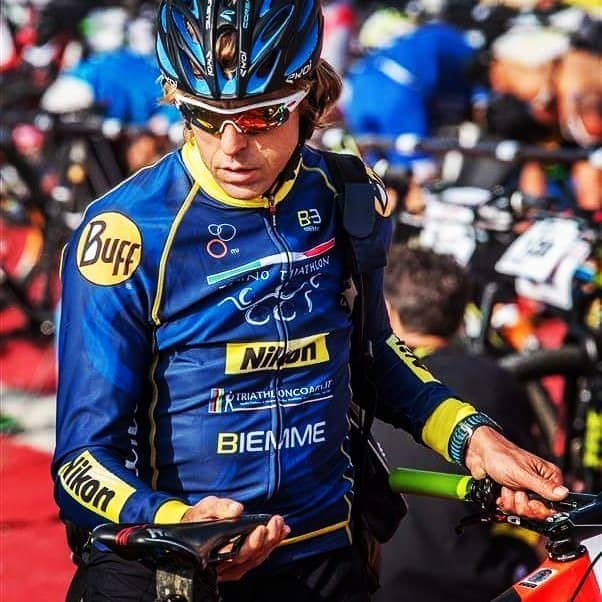Gökay Ürk recently got in touch with Andrea Gabba, coach of the Turkish Triathlon Federation National Team, to discuss his new role. Andrea, who is also quite an accomplished triathlete, was brought on as a coach earlier this year and has some insights into the current state of the sport in Turkey.

Andrea, can you tell me about yourself? When did you first get involved with triathlons and what first drew you to the sport? What would you consider to be your major accomplishments over the course of your career?
I started participating in triathlons in 1992 following the death of my father. Back then, triathlon was a new sport and we tried and tested everything on ourselves. In addition to competing, I also started to train myself and other triathletes, many of whom were my friends. My dream was to compete in the Hawaiian Ironman and in 2002 I realized this dream. After that, in 2003, I stopped doing races at a high level and I dedicated myself to coaching athletes, including my now-wife Nadia Cortassa who was also my best athlete. In 2004, another dream was realized – I participated as a coach at the Athens Olympics and Nadia, whom I was coaching, came in 5th in the triathlon! Then in 2006, when I was the coach of the Italian national women’s team, we won the World Championship in the team division.
How long have you been the coach for the Turkish National Triathlon Team and why did you decide to take this position?
I started coaching the national team in March 2013 and I hope to work with the federation for many years to come. In Italy I was very unmotivated and, to be honest, slightly disappointed with the state of triathlon. So when Hamdi Gunes [president of the Turkish Triathlon Federation] offered me the opportunity to work in Turkey, I gladly accepted.
Everyone I’ve worked with has been incredibly friendly and welcoming. I want to thank President Hamdi, coach Mert Onaran, general secretary Sheri and all the athletes and coaches. I am glad to be one of you! Furthermore, I look forward to developing the sport of triathlon in Turkey. We must be patient, but I’m sure in a few years we will have some high-level athletes and triathlon will be a very popular sport in Turkey.
Can you tell us a bit about the team – is triathlon a big sport in Turkey?
Triathlon is not a big sport in Turkey but I think it will definitely grow in popularity over the next few years. Since it’s a relatively new sport and quite dynamic, triathlon appeals to both kids and adults alike. When training for triathlon, you are constantly changing things up in practice – it’s necessary when you have to be able to swim, bike and run.
The key to triathlon’s development in Turkey is the Olympic Games. If some Turkish athletes qualify for the 2016 Games in Rio, it will be covered in the media and I’m sure this will raise the profile of the sport. I work with four good coaches (Mert Onaran, Alper Koksoy, Zulfu Karabulut, Zekeria Yuceturk) and twenty athletes. All the athletes are under the age of 23, and a lot of athletes are 16-17 years old – this is very good for our future!
How has the Turkish National Team fared in 2013?
This year I started working with our national team and, so far, I have found 4-5 really good junior and youth athletes. For the first time we won a medal (silver) in the European Cup Race (Ipek Oztosun). We also competed in the World Championship (Ipek Oztosun, Sabri Oge, and Ali Atlan) and won a gold medal in Balkan Championship. I believe that our juniors will develop into very good athletes. If our federation is diligent in developing and nurturing junior and youth athletes, we will have a very strong team in the future.
With regard to the elite competitors, we won one silver (Ece Bakici) and one bronze medal (Berrak Irmak) in Balkan Championship. This is very good but it is not quite enough to be competitive in the elite triathlon world cup races.
What are your goals for the Turkish National Team?
Right now I have my eyes set on two things: one is the development of triathlon in Turkey and the other is to lead the team to the World Championship, the European Championship and, of course, the Olympic Games. I work every day for the Olympic dream.
Do you think the Turkish triathletes have a chance of qualifying for the 2016 Rio Olympics?
Our federation and coaches are working very hard to make this happen. It will not be easy to qualify for Rio. I think that the team will definitely be ready for the 2020 Olympics. Even though it may be difficult to qualify for 2016, we are working hard and are always on the lookout for new athletes. I think we can do it!
What are the hurdles, if any, that you face when trying to train triathletes in Turkey?
The first problem is finding athletes. Since so few people do triathlon in Turkey, it is a small pool to choose from.
The second issue is that most triathletes in Turkey do the sport just for fun and, as a result, don’t train as much as triathletes in other countries. Related to this, it can be difficult for athletes here to get more serious about their training because they aren’t being funded by teams or sponsors and thus have less time to focus on the sport. But to seriously compete in international races, the Turkish athletes must train more. It’s a tough situation to be in, but the national team is making the best of it.
How does triathlon in Turkey compare to other countries in terms of the Federation, race organizations, triathletes, and fans?
Our international races in Turkey, which take place in Alanya, Antalya and Istanbul, are some of the best in Europe. There was even live coverage of the Istanbul race on TV, which was great to see.
However, other federations have more athletes and the sport is given a lot more media attention. European elite athletes also train and compete abroad, especially since travel between, say, France and Germany is not that expensive. For us, though, going from Turkey to these countries requires much more of an investment and finding funding can be difficult at times.
Is there a certain area in the world where most triathlon races are held? How important is it for triathletes to have international experience?
The most important races are in central Europe (Germany, France, Spain, and Italy), the Commonwealth nations (England, Australia, South Africa, New Zealand, and Canada) and the United States. Training and competing in these countries is the only way for our athletes to improve their level of performance. It’s not enough to compete in national races. International races are so fast, they teach athletes the importance of transitions and how a small mistake can be the difference between winning and losing a race.
Do you think triathlon as a sport is becoming more popular in Turkey? How can we get more people involved in the sport?
There are two ways: 1. We qualify for the Olympic Games. 2. We find people in the media, such as yourself, that give us the chance to speak about this wonderful sport! Thank you very much and, to all the Turkish people, I’m proud to be a coach for your country. Follow us on the way to the Rio Olympic Games!
To keep up with Andrea Gabba and learn more about is work, be sure to follow him on Instagram.
ATÖLYE Spotlight is our series on the inspiring community members of Istanbul’s most creative space.
All images courtesy of Andrea Gabba.










What a man & Trainer ! I love his visions and belive Andrea Gabba can make it comming true !